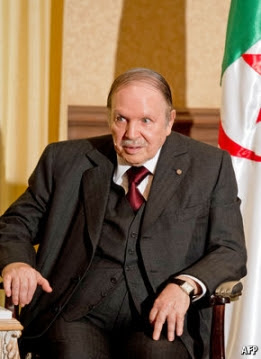The Economist
Middle East and Africa

Rumours swirl around an ailing president.
Anyone seen this man?
IT SOUNDS like a missing-person notice: 78-year-old man, wheelchair-bound, not seen in public for over two years. But this is a description of Algeria’s president, Abdelaziz Bouteflika, whose ill health, including two strokes in recent years, has led to rumours of a palace coup.
Mr. Bouteflika can hardly speak and is said to communicate by letter with his ministers, who nevertheless insist that the old man is compos mentisand in charge. But several close associates of the president aren’t buying it.
Having not see.n Mr Bouteflika for over a year, they have demanded a meeting with him—so far to no avail. Missing person is right, they say.
Algerian politics is nothing if not murky. For decades a cabal of unelected power brokers has run the show. Known as le pouvoir (the power), the shadowy clique is composed of members of the economic, political and military elite. But with Mr. Bouteflika’s health in decline, there appears to be a struggle within the group over who will succeed him.
The divide has manifested itself in changes to the security services ostensibly enacted by Mr Bouteflika since his re-election in 2014. Several top figures have either been pushed out or arrested, most notably General Muhammad “Toufik” Mediène, who was sidelined after leading Algeria’s intelligence service, known as the DRS, for 25 years. With a file on nearly everyone, Mr Mediène was a political kingmaker (and a brutal foe of Islamist rebels).
In January the DRS was dissolved and replaced by three new directorates under the president. The moves seem aimed at clearing out independent figures, such as Mr Mediène, from le pouvoir. More power now rests with Ahmed Gaid Saleh, the army chief of staff, who is a close ally of Mr Bouteflika, and with the president’s younger brother, Said, who some say is calling the shots. But experts say Said does not have the support of the army, or the public.
Algerians have grown accustomed to mystery. Few knew that Houari Boumédiène, Algeria’s second president, was even ill until he died in 1978. At the time, Mr Bouteflika was seen as a potential successor, only to be passed over by the army. Two decades later the generals finally tapped him for the job.
But today’s uncertainty comes at a bad time for Algeria, which largely avoided the tumult of the Arab spring. The government has been able to buy peace at home with subsidies, social housing and big pay rises for state employees. But collapsing oil revenues make this system unsustainable. Protests over rising prices and stagnant incomes are now common. Unrest in neighbouring Libya and Tunisia, and the spectre of jihadism, have added to the anxiety.
Revisions to the constitution, promised during the Arab spring and handed to parliament only last month, are meant to appease the public. They would limit presidents to two terms, reversing a move by Mr Bouteflika who, if alive, is currently serving his fourth term, and make the Berber language official. Otherwise, they mostly maintain the status quo. There was some debate over creating a post of vice-president to grease the succession process. This was rejected. By whom is unknown.






